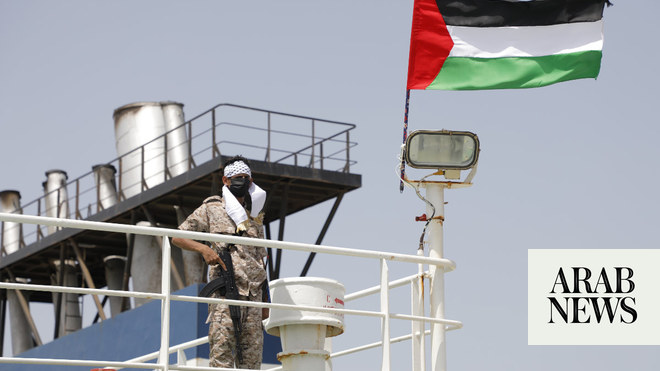
Donald Trump will also be warned that military action against the Islamic Republic could escalate into war
The US response could involve military, political and economic actions
WASHINGTON: The Pentagon will present a broad range of military options to President Donald Trump on Friday as he considers how to respond to what administration officials say was an unprecedented Iranian attack on Saudi Arabia’s oil industry.
In a White House meeting, the president will be presented with a list of potential airstrike targets inside Iran, among other possible responses, and he also will be warned that military action against the Islamic Republic could escalate into war, according to US officials familiar with the discussions who spoke on condition of anonymity.
The national security meeting will likely be the first opportunity for a decision on how the US should respond to the attack on a key Middle East ally. Any decision may depend on what kind of evidence the US and Saudi investigators are able to provide proving that the cruise missile and drone strike was launched by Iran, as a number of officials, including Secretary of State Mike Pompeo, have asserted.
Iran has denied involvement and warned the US that any attack will spark an “all-out war” with immediate retaliation from Tehran.
Both Pompeo and Vice President Mike Pence have condemned the attack on Saudi oil facilities as “an act of war.” Pence said Trump will “review the facts, and he’ll make a decision about next steps. But the American people can be confident that the United States of America is going to defend our interest in the region, and we’re going to stand with our allies.”
The US response could involve military, political and economic actions, and the military options could range from no action at all to airstrikes or less visible moves such as cyberattacks. One likely move would be for the US to provide additional military support to help Saudi Arabia defend itself from attacks from the north, since most of its defenses have focused on threats from Houthis in Yemen to the south.
Gen. Joseph Dunford, chairman of the Joint Chiefs of Staff, emphasized to a small number of journalists traveling with him Monday that the question of whether the US responds is a “political judgment” and not for the military.
“It is my job to provide military options to the president should he decide to respond with military force,” Dunford said.
Trump will want “a full range of options,” he said. “In the Middle East, of course, we have military forces there and we do a lot of planning and we have a lot of options.”
US Rep. Elissa Slotkin, D-Michigan, said in an interview Thursday that if Trump “chooses an option that involves a significant military strike on Iran that, given the current climate between the US and Iran, there is a possibility that it could escalate into a medium to large-scale war, I believe the president should come to Congress.”
Slotkin, a former top Middle East policy adviser for the Pentagon, said she hopes Trump considers a broad range of options, including the most basic choice, which would be to place more forces and defensive military equipment in and around Saudi Arabia to help increase security.
A forensic team from US Central Command is pouring over evidence from cruise missile and drone debris, but the Pentagon said the assessment is not finished. Officials are trying to determine if they can get navigational information from the debris that could provide hard evidence that the strikes came from Iran.
Pentagon spokesman Jonathan Hoffman said Thursday that the US has a high level of confidence that officials will be able to accurately determine exactly who launched the attacks last weekend.
US officials were unwilling to predict what kind of response Trump will choose. In June, after Iran shot down an American surveillance drone, Trump initially endorsed a retaliatory military strike then abruptly called it off because he said it would have killed dozens of Iranians. The decision underscores the president’s long-held reluctance to embroil the country in another war in the Middle East.
Instead, Trump opted to have US military cyber forces carry out a strike against military computer systems used by Iran’s Revolutionary Guard to control rocket and missile launchers, according to US officials.












